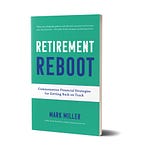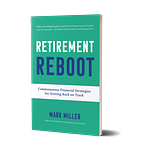
This week on the podcast, we take a look at what the pandemic is teaching us about ways to improve Medicare. The crisis has put a bright spotlight on weaknesses in many of the systems designed to protect Americans from risks. But older people are more susceptible to serious illness and death from the virus. The problems in Medicare were evident before the pandemic, and now they are becoming even more clear.
My guest is attorney Judith Stein, the founder and executive director of the Center for Medicare Advocacy, which provides education, advocacy and legal assistance to help seniors and disabled people get access to Medicare. Judy is a pioneer in this work and one of the most knowledgeable people in the country on Medicare.
I expect Medicare reform will be on the agenda in Washington after the pandemic recedes. If nothing else, the looming exhaustion of the Part A Hospital Insurance trust fund in 2026 must be dealt with, as discussed in last week’s newsletter. But the pandemic underscores problems in the way that Medicare oversees nursing homes and the rising privatization of the program. We also should deal with the gap in dental, vision and hearing coverage, enrollment simplification and more.
Listen to the podcast by clicking the player icon at the top of this page. The podcast also can be found on Apple Podcasts, Spotify and Stitcher.
I also addressed this question in my column this week for Reuters.
How will the pandemic impact the finances of Social Security and Medicare?
When it comes to the financial health of retired Americans, nothing is more important than Social Security and Medicare--hands down.
The programs are nearly universal among senior citizens: Last year 64 million Americans received Social Security benefits and 62 million were on Medicare.
Without Social Security benefits, about four in 10 Americans aged 65 and older would have incomes below the poverty line; for about half of seniors, Social Security provides at least 50% of their income. And Medicare is the only health insurance game in town for seniors.
But how is the financial health of these critical social insurance programs holding up during the pandemic--and how will they fare after the emergency recedes? I took at look at the financial outlook for both programs in my latest Morningstar column.
The number of family caregivers is soaring, and their social isolation is growing
A new study from the National Alliance for Caregiving and AARP concludes that the number of unpaid family caregivers increased by 9.5 million from 2015 to 2020 to 53 million people. The report, Caregiving in the U.S. 2020, also reveals that family caregivers are facing growing social isolation.
And - that was before the pandemic. This compelling video report from the PBS NewsHour makes clear how the pandemic has made the job of caregiving more difficult, further isolating people who already faced steep challenges. Hundreds of caregivers reached out to the NewsHour to tell their personal stories; this story features six of them.
Insulin price cap for 2021 leaves experts befuddled
President Trump announced a plan to give Medicare Part D enrollees access to plans next year featuring a maximum $35 out-of-pocket charge. But the move left drug pricing reform advocates disappointed and experts scratching their heads. As STAT reports:
President Trump used a glitzy Rose Garden address, flanked by pharmaceutical company CEOs and patient advocates, to boast of his administration’s successes lowering drug prices and to detract from his political rivals’ efforts on the same issue.
But the news he was touting was modest at best: Drug makers agreed to participate in a minor, voluntary Medicare program that will likely only provide a limited discount on insulin for a small subset of the 60 million seniors with Medicare coverage.
The average diabetic spends nearly $5,000 a year on drugs, according to Merrill Goozner, a journalist and author with deep knowledge of the pharmaceutical industry, who wrote this fascinating essay last winter on why insulin should be free.
Recommended reading this week
To fight COVID19, don’t neglect immunity and inflammation . . . Outbreaks force a harder look at nursing homes . . . Podcast interview with famed investor Charley Ellis on why active investing is still a loser’s game . . .
Not a subscriber yet? Take advantage of a special offer
Sign up now for the free or subscriber edition of the newsletter, and I’ll email a copy of my latest retirement guide to you. This one looks at dealing with the Social Security Administration during the COVID19 crisis.
Customer service at the Social Security Administration has changed during the coronavirus crisis - the agency closed its network of more than 1,200 field offices to the public in March.
Just a reminder- subscribers, have access to the entire series of guides at any time. Click on the little green button to subscribe, or go here to learn more.












